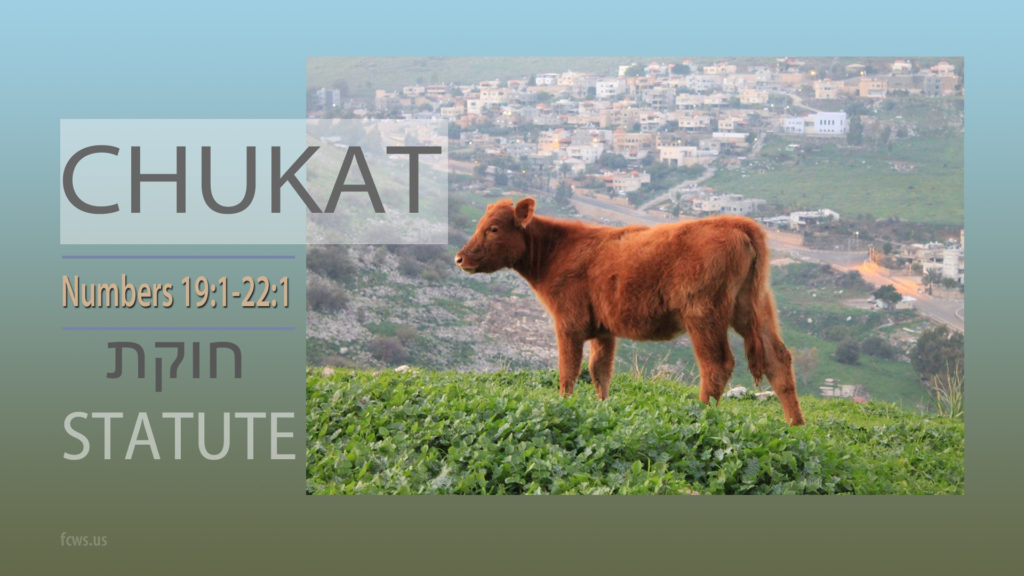 This section of the Bible contains at least three interesting and important subjects. These include the (1) red heifer, (2) waters of Meribah and (3) incident of serpents in the wilderness. The most mysterious of the three is that of the red heifer. A red heifer was chosen, slaughtered and burned completely by the priest. The ashes of the red heifer were collected and preserved in a clean place. Evidently, the ashes were then mixed in water which was used in a purification ritual. Also, continuity was maintained from the ashes of one heifer to the next one that was used in this manner.
This section of the Bible contains at least three interesting and important subjects. These include the (1) red heifer, (2) waters of Meribah and (3) incident of serpents in the wilderness. The most mysterious of the three is that of the red heifer. A red heifer was chosen, slaughtered and burned completely by the priest. The ashes of the red heifer were collected and preserved in a clean place. Evidently, the ashes were then mixed in water which was used in a purification ritual. Also, continuity was maintained from the ashes of one heifer to the next one that was used in this manner.
Today, there is a search by some groups in Israel for a suitable “red heifer” and for the ashes from the heifer previously sacrificed. The previous sacrifice would have been made sometime near the end of the Second Temple era. Some maintain that these two ingredients will have to be produced before purification can be accomplished for Israel to ascend the “Temple Mount” to begin work of the Third Temple.
Israel wandered in the desert for about 38 ½ years as a result of the judgment passed upon them. They had failed to trust that God would be able to bring them into the land of Canaan. Soon they forgot the reason for their distress and blamed both God and Moses for their dilemma. They murmured along the way.
Moses is one of the most “positive” characters portrayed in the Bible. He repeatedly interceded for Israel even when God proposed eliminating them and starting over with him and his descendants. However, during the wandering in the desert, even Moses became critical of the people. At Meribah, he was instructed by God to bring forth water for the people in a very specific way. Moses disobeyed and, in addition, demonstrated his disgust for the people by calling them “rebels” or, perhaps, “fools”. Even though Moses disobeyed God before the people, God was merciful and provided water. As a result of this seemingly “minor” incident (if we place it in the context of 40 years of consistently faithful service before God) Moses was judged with the rest of that generation and was not allowed to enter the land.
Sometimes we have difficulty understanding God’s judgments. This incident with Moses is one such case. Was God too harsh on His servant? Who is in a position to judge what God does? Now, with the advantage of a long, historical perspective, we suspect that this was fully in accordance with God’s plan of redemption. This is especially true, when taken together with the account of the bronze serpent which is recorded as closely following these events. Moses, God’s instrument of deliverance from Egypt, would not lead Israel into the Promised Land. This would be accomplished by Joshua ben Nun. Note also that earlier, Moses had changed Joshua’s name from Hoshea (Numbers 13:16). Joshua would be the name given to the ultimate “goel – redeemer” (Luke 1: 31).
As Israel continued to complain during the journey, God again judged them by sending serpents among the people. To me and to Indiana Jones, this would represent a terrifying situation. Many were bitten and died. The people confessed their sin and petitioned Moses to pray to God to remove the serpents. We presume that Moses repeated this petition to the Lord. God’s answer provides much insight into His interaction with His people. He instructed Moses to craft a “bronze serpent” and to place it on a staff and set it in the midst of the camp. If a person was bitten, then he had a choice (a) to ignore God’s provision and die, or (b) to humble himself and exercise faith by looking to God’s provision, the bronze serpent, and live.
Almost 1500 years later, Joshua’s namesake Yehoshua or Jesus would compare His ministry to that of the “bronze serpent”. He said, “As Moses lifted up the serpent in the wilderness, even so must the Son of Man be lifted up; so that whoever believes will in Him have eternal life” (John 3:14-15). Jesus became an object of faith. He said that He was not sent to further judge man who was already in trouble (snake bitten), but was sent as an object of faith, i.e., an object of life.
When we face difficulties we pray and request that the difficulties be removed. Sometimes God’s answer is not the removal of the difficulty but a means to overcome that difficulty. We must be in a position to utilize what God provides.
Please note that my new book, “Israel: God’s Interdimensional Portal” is available for download on Amazon.